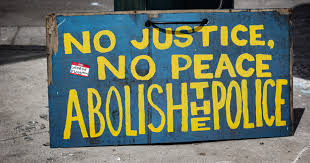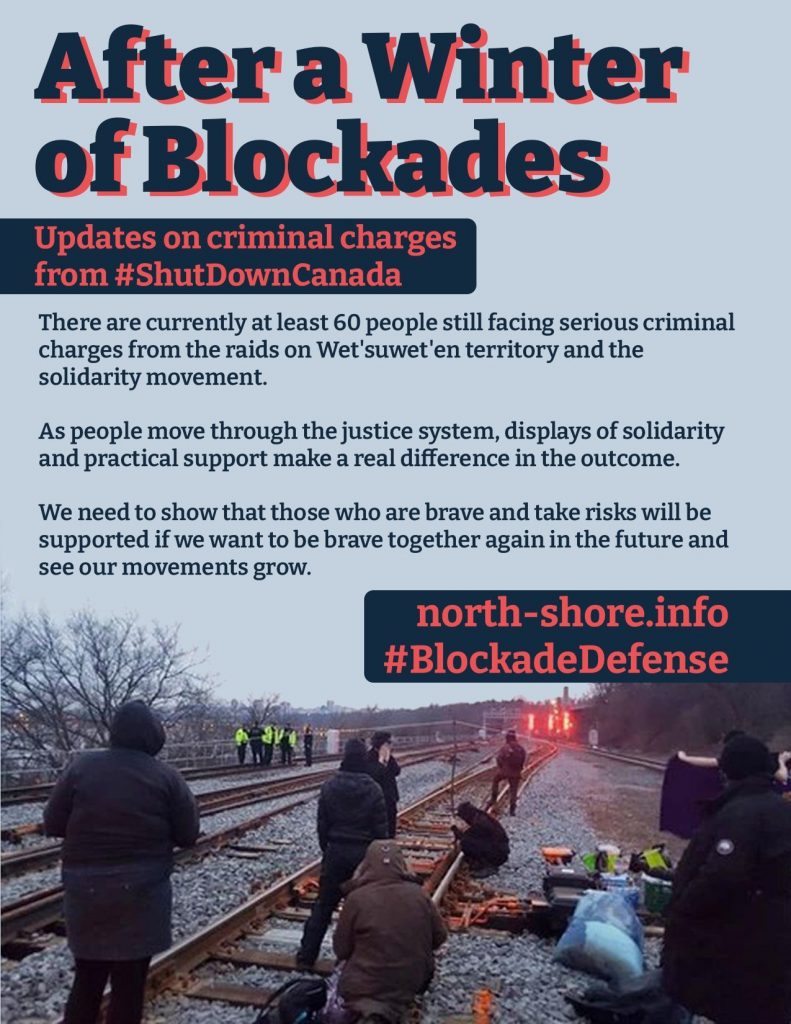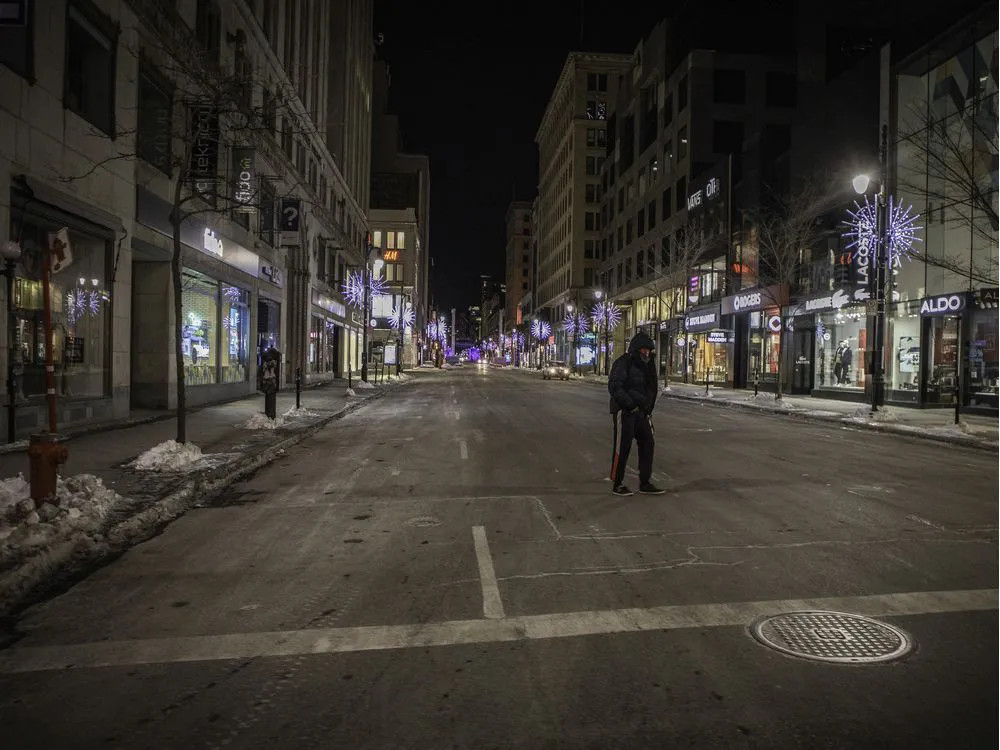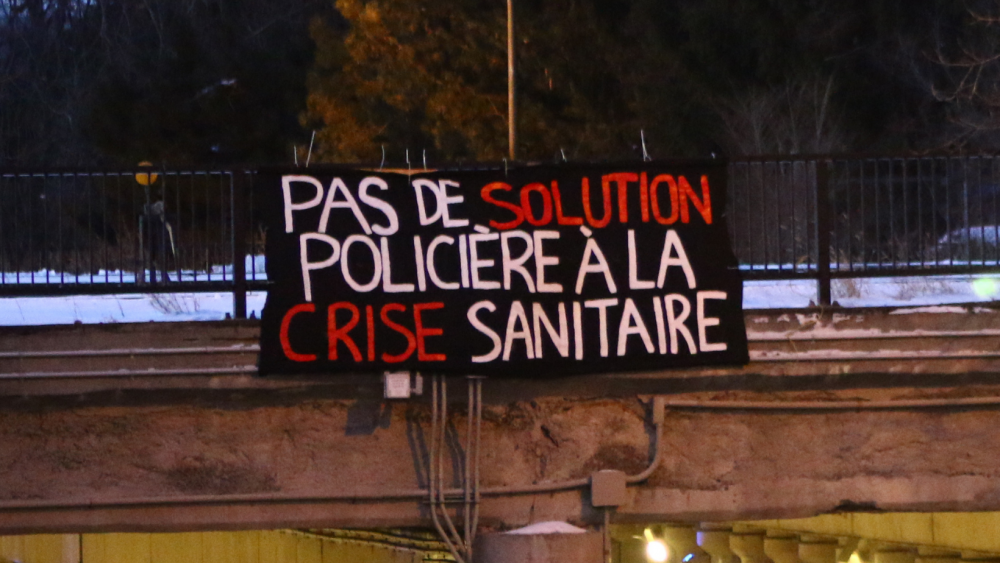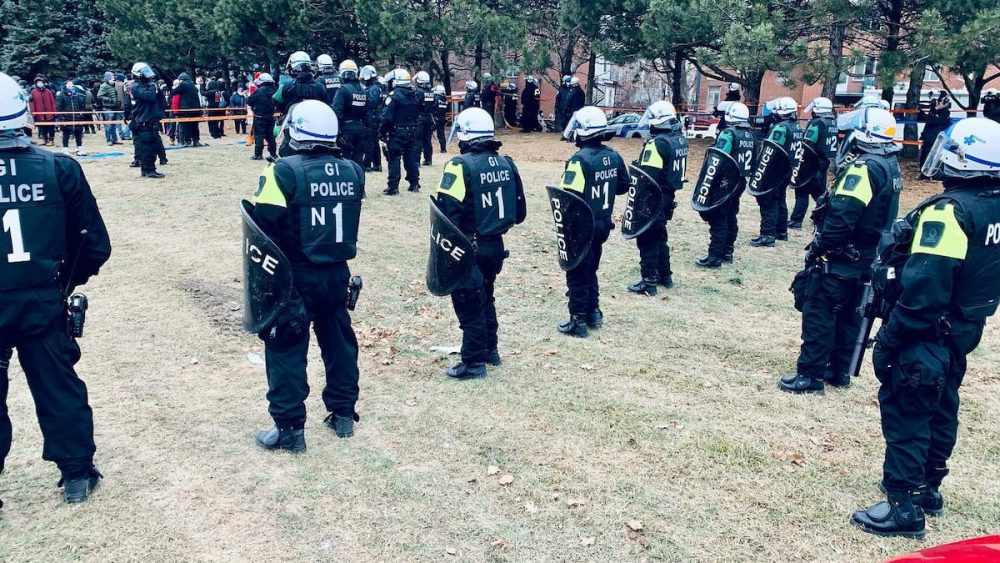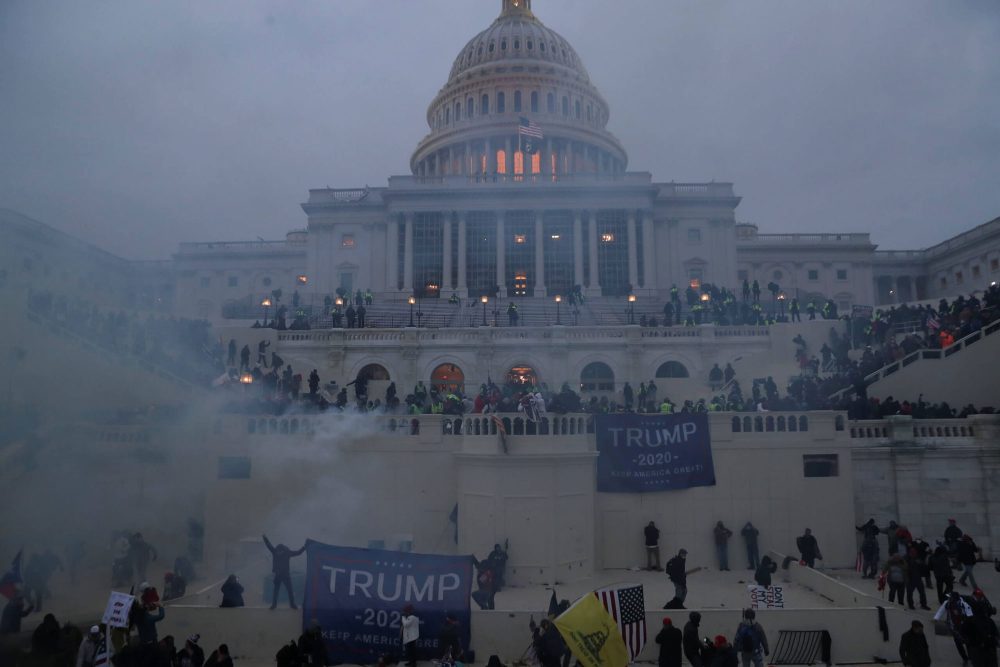
From Radio Fragmata
So much could be said about the spectacle recently witnessed at Washington, DC’s federal capitol building, however we will write a quick statement, hoping to further understand the situation as well as to assert a need on behalf of comrades in the States who face both imminent and ongoing grassroots violence and parallel state repression. Essentially, what we saw was not an insurrection or revolt; what the world witnessed was a permitted fascist temper tantrum.
In the Greek context, for example, we witnessed the Macedonian-name-protests rushing the Parliament in Syntagma Square before the verdict on their stupid case, and police essentially functioning as minimally as possible in part to show their obvious bias and sympathy for those seizing Parliament, while also trying not to lose their jobs. The chants heard at the capitol building – such as “U-S-A” and “Trump is President, Christ is king!” – easily find Greek analogues.
On January 6th, 2021, the American government gathered for its ritual of certifying the Electoral College results, signifying the transfer of power to a new president. It is an archaic ritual that – because it began prior to modern travel, and faraway states needed the months after the election to travel across the country by horse and carriage to participate – is held in January rather than immediately following the election’s outcome in November. This event was seen by both Trump and his followers as the last ‘hoorah’ to disrupt the transfer of power from the far-right Republican Party to the moderate right-wing Democratic Party.
The US security state’s very different approach to the MAGA mob versus an antifascist, anarchist, or abolitionist demonstration was made quite overt on the 6th. It was so obvious, in fact, that mainstream media outlets have seized upon it, in their embarrassing public displays of trying to grasp just why the police put on their kid-gloves with these self-indulgent cowards seeking to reinforce the very worst of what already exists in the US, storming a building that has its very own police force (with an annual budget of more than $500 million).
The police tolerance exhibited for Trump’s supporters was purposefully obvious. It has been public information that the extreme right in the US have chosen to infiltrate law enforcement and political positions of power (even cited in a report by the FBI) ever since the fall of the guerrilla neo-Nazi group The Order in the mid-1980s and white supremacist Timothy McVeigh’s bombing of an Oklahoma City federal building in 1995 that killed 168 people. Both were inspired by the white supremacist bible at the time, the fictional novel The Turner Diaries (1978), which featured a similar assembling of fascists identifying as patriots. Apart from formally rampant white supremacy throughout the American police force, every single police union had endorsed Trump in the US in the run-up to the 2020 election. While police tend to be more diverse in the US compared to many countries around the world, the original purpose of the police in the US was to catch slaves and crush unions, so it is inevitable that regardless of race, there is an element of fascism in such a uniform.
If BLM, anarchist, or anti-fascist banners were raised on this day, there would have been mass arrests, far more intense brutality, and a likely massacre. While five people have died due to the events of the 6th (three due to self-inflicted injuries such as tasering themselves and causing a heart attack; falling off of scaffolding; and, being trampled to death while holding a “Don’t Tread on Me” flag. One cop died due to assault*, and only one demonstrator due to police violence, and the other three literally died due to their own stupidity and maintained their white privilege even in their humiliating deaths. If this was not a white supremacist event—or an ostensibly fascist event – dozens would have been killed by the police.
Apart from the daily mass murder of people of color and poor people in the US by police, the fates of Kyle Rittenhouse and Michael Reinoehl, for some very recent examples, help to explain the behavior of the police on that day, how they acted in parallel to their grassroots fascist counterparts.
Kyle Rittenhouse murdered two people during a demonstration against the shooting of Jacob Blake—a Black man shot seven times in the back in front of his children by a white police officer in Kenosha, Wisconsin. The event left Blake paralyzed, but the officer who shot him will face no charges despite video evidence. Rittenhouse is currently on trial for his murders, and was allowed to move freely past the police line just shortly after killing people. Michael Reinoehl, on the other hand, was a self-proclaimed antifascist from Oregon, who in self-defense shot a fascist during a Trump protest. Reinoehl went on Vice News shortly after the event to proclaim the action was in self-defense, and one day later, he was shot over 50 times by federal police. Trump openly bragged about Reinhoel’s assassination. With few exceptions, his fate was rarely discussed in the media, but shows the obstacles and struggle revolutionaries face versus the permitted ‘rebellious’ behavior of fascists and other fanatics for the misery of the world today. The courts are no different. The sentencing and investigations that inevitably follow the actions of the right are managed in a way resembling obligation, rather then the passionate and brutal judicial attacks by the state on revolutionary movements seeking liberation.
We watched this day as a liberal establishment shed spineless tears, a delusional grassroots fascist effort played coup games under the babysitter’s gaze of the police, and the media desperately tried to explain the situation, with cautious laughter: ‘it’s only cosplay, nothing to see here.’ What is certain is that those seizing the capitol by being invited into it, gates drawn, exhibited no courage and nothing that took place resembled an insurrection as the media and moderates try to claim.
When revolutionary movements that reject the system take to the streets, they are met with a very different situation. An established moderate right-wing party like the Democrats, or allegedly ‘nuetral’ law enforcement such as the FBI, will make an example of some of these right-wing delusional deadbeats, but it will be in the same way the New Democracy government in Greece made an example of the neo-nazi group Golden Dawn, or Facebook took down dozens of anarchist profiles to compensate for censoring an equivalent number of neo-Nazi profiles. It is a deceptive attempt to solidify an aesthetic of neutrality as they continue to impose the horrible society we reject.
The lengths the right went to in this action foreshadows the coming passive civil war already declared by the right, and is likely more emboldened than ever following January 6th. One thing that is unique about the American right, is that when they hold weapons it is not a crime until they are used to attack someone, and even then – in the case of Trayvon Martin or the recent shootings of antifascists at BLM demonstrations – the courts will show them a tolerance we would never get.
Apart from this obvious concern over the escalation of alternative and grassroots forms of violence by the extreme right, the incident has emboldened the equally dangerous American liberal establishment. The leaders of political “sanity” and moderation are the most victorious due to this fascist tantrum. The dictators of what is and is not politically appropriate, who have the audacity of pinning together liberationists, insurrectionists, and abolitionists with fascists and anti-Semitic conspiracy theorists have found true victory here, as you can see in their heinously ignorant references of insurrection and anarchy in regards to the events that took place at the US capitol building on January 6th.
For years, the Trump administration has forcibly established so-called antifa, anarchists, and BLM as terrorist organizations while refusing to denote the same status to neo-Nazi and white nationalist groups. Now, there is bipartisan support for delegating groups such as QAnon (a group that believes Trump, a man facing dozens of rape accusations including rape against minors, is saving the country from a Jewish conspiracy of celebrities and politicians using their power to traffic children) and the Proud Boys (self-identified Western chauvinist group founded by Vice Media founder Gavin McInnes) will undoubtedly be used to further the already existing harsh repression of anarchist and revolutionary abolitionist movements. Just a week before the 6th, Trump’s administration drafted a bill barring all suspected antifascists and anarchists from entering the country. This bill comes from a history of recent expansions and advances in the power of border authorities under the Obama administration and the Patriot Act under the Bush administration, and will certainly go without much criticism from the Biden administration.
All of this comes as the Democrats have taken over the White House and Congress, while the far right remains in control of the Supreme Court, which has severe implications for revolutionary movements and the livelihoods of marginalized and excluded people. The recent popular support that has come out of years of Trump’s far-right absurdity and the recent Black-led revolt following the death of George Floyd and others is already facing a huge assault by the deceptions of the democratic establishment since Biden’s victory in November. It certainly will not help those facing years in prison for resistance related to the 2020 Black Lives Matter revolt.
The liberal establishment and the left that still maintain faith in the state and reform would like to refer to this event as a “failed coup” or an attack on the will of the people. These predominantly privileged calls come from a voice that sees the electoral system as one that listens to them. For most people in the US, their recent vote was motivated by guilt or a sad obligation to pick between two evils; they have been conditioned to expect nothing from a state that flaunts the motto “freedom isn’t free.” As anarchists, we reject the state’s electoral process entirely, and see no “will of a people” ever possibly upheld in a system orchestrated through centralized power and coercion. The choices provided to us in their spectacle of democratic voting are not aligned with our path to freedom, so we reject such rituals. Besides, settler colonialist rituals such as voting for representation in a Eurocentric system can never grant freedom on stolen land.
As anarchists, abolitionists, and revolutionary movements continue ahead with a struggle more sincere than trending concerns performed by aloof citizens and pretentious celebrities, we must double down on solidarity in order to not remain isolated, as the violence intended by grassroots right-wing groups coincide with a brutal police crackdown under the smiling and deceptive face of the democratic liberal establishment.
Watching politicians huddle in fear, while police and the right scuffle, it’s hard to not simply laugh at the absurdity of some of what transpired that day. However, in recent weeks, antifascists have been targeted and shot in the Pacific Northwest, and on the same day as the fascist tantrum at the capitol building, an attempted public lynching of a black woman took place at a neofascist rally in Los Angeles. These instances are what brings our laughter to a concerned pause.
The right has taken a fairly postmodern approach to racism in the US, feeling shackled by the grip of the moderate right-wing democratic establishment’s PC identity politics (that seem to address everything other than systemic classism and racism, and see giving settler colonialist jobs to colonized people an ethical form of reparation and resolution). They have adapted to a deep-web world of cryptic far-right conspiracy theories that somehow lead the poor to follow billionaires and seek out Jewish lizard people ‘pulling the strings’ of global capitalism via 5G networks, as opposed to just saying the N-word out loud like they all want to, but still want the option of running for office. This is a global concern, as fascists of this approach have breached the borders of the world from the US, to Brazil, to Germany, and so on.
It is essential that we maintain our strength against the technocrats and liberal establishment, as well as remain on guard against the many, and at times, confusing faces of contemporary fascism. We also must recognize our emboldened movement. In the US, anarchist, antifascist, and abolitionist movements have grown drastically despite heinous repression, and a new generation of courageous youth has shown their strength throughout 2020 and to this day.
Revolutionary solidarity goes beyond borders and prison walls, and helps us to remain alert, connected, and never forget each other as another lockdown and a new era of moderate fascism approaches us.
Revolutionary solidarity for all those facing prison for the revolt against white supremacy.
Revolutionary solidarity for all those who engage in sincere struggle against the state and capitalism.
– RadioFragmata / January 2021
Post-Script
1. Brian Sicknick, the cop who died due to his injuries on the 6th has since had his online Parler account uncovered. Parler is a social media platform popular among the right. It was discovered that the officer was a follower of various far-right accounts such as Team Trump, Gavin McInnes, and Alex Jones.
2. While unsurprising, it has since been confirmed that various off-duty police officers and right-wing politicians were among the mob at the capitol on the 6th. Reports claim that some officers even showed their badges to on-duty officers during the melee.
Stay up-to-date with repression against revolutionary movements and ongoing struggles via the following websites:
Up against the law legal collective
Portland General Defense Committee



